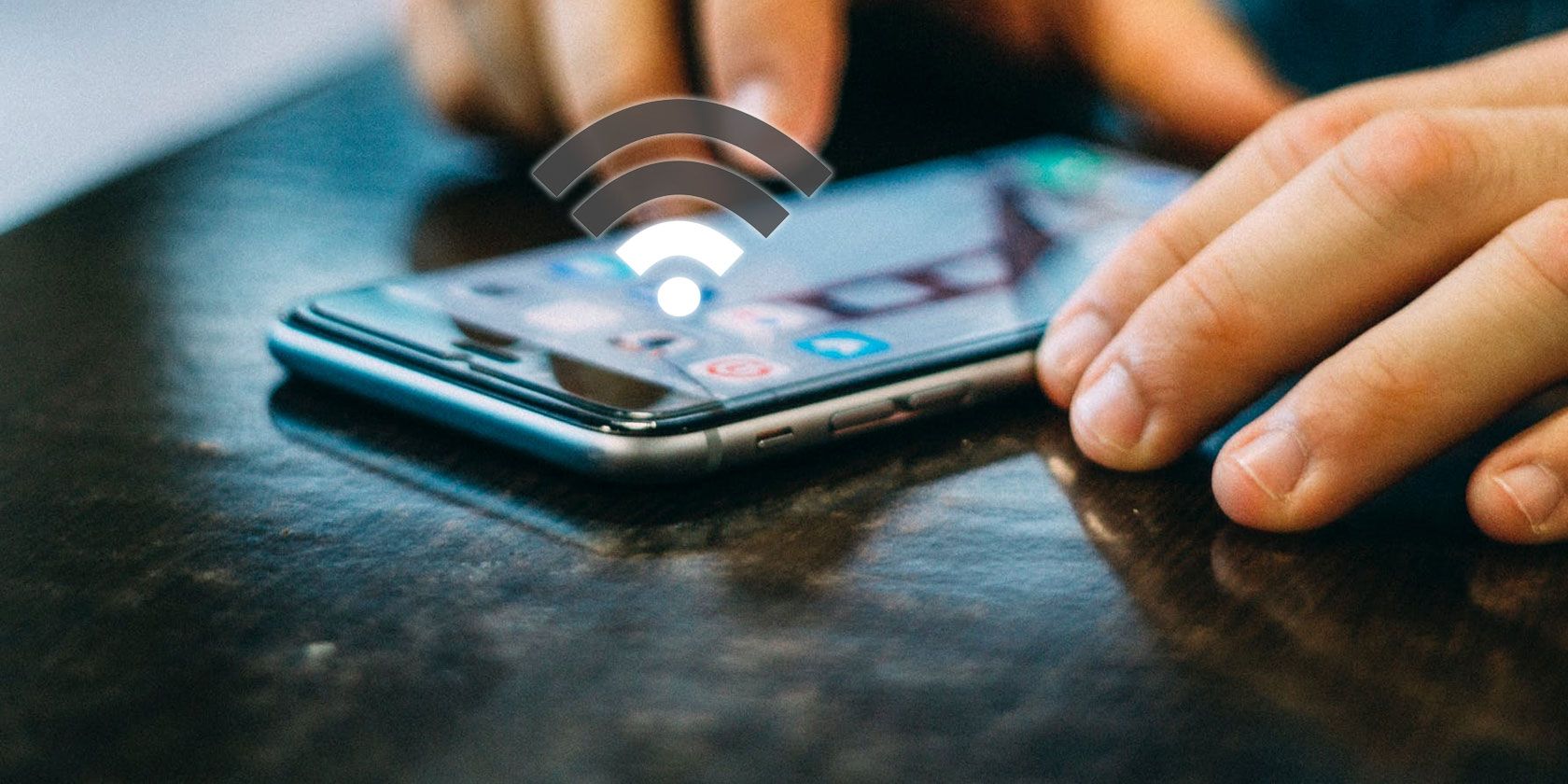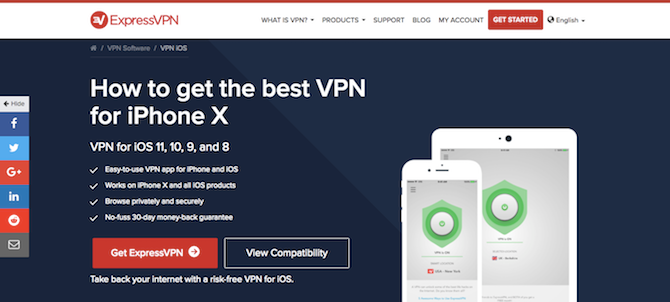
Smartphones are now the main way most of us connect to the internet. And it means getting the fastest possible internet speeds on our mobile devices is more important than ever.
But that doesn’t always happen. There are lots of things that can slow you down. Let’s take a look at the main reasons why your internet is so slow on your phone, and how you can fix them.
1. Poor Router Position
One of the main reasons your phone Wi-Fi is slow is that your router has been positioned in the wrong place. A Wi-Fi signal has a range of up to 230 feet, and the further it travels the slower it gets. It can be blocked by large physical objects, like walls, floors, and doors.
So if you’re a distance from the router—like in the furthest bedroom in your house, or even outside—the speeds you get may be a lot slower than you’d expect.
There’s a quick way to test. The Wi-Fi icon on your phone’s status bar gives you a rough indication of the signal strength.

- When the icon is full, you’ve got a strong signal. This suggests your slow internet has a different cause.
- When it’s empty your signal is weak, and other Wi-Fi devices like your laptop should also be affected. Move closer to your router and your signal strength—and internet speed—should improve.
When the weak signal does improve as you get closer, it shows that your router’s position is the problem. Try experimenting with different router positions to see if you can get better Wi-Fi coverage throughout your home.
If your speed doesn’t improve when you get closer to the router, you may have other problems you need to fix.
2. Congested Wi-Fi
Another router issue that makes your phone internet slow is congestion. Routers broadcast their signal on a specified channel, but if your neighbors have their routers set to the same channel it can become congested and degrade the performance for everyone.
This can be a problem especially in apartment blocks, where you have a lot of routers crammed into a relatively small area.
To fix this, you need to use software that can help you find the best channel for your router. We recommend the Wi-Fi Analyzer app on Android, or the AirPort Utility on iPhone.
3. Wi-Fi Noise
Wi-Fi is also susceptible to noise from other appliances in your home. Things like microwaves, wireless doorbells, and cordless phones can interfere with the signal from a router running on the 2.4GHz band.
Most modern routers can work on both the 2.4GHz and 5GHz bands. The latter is a lot less prone to interference. If you’ve got a reasonably recent router that supports this, you can delve into the router’s settings to make the change.
Before you do it, though, you need to make sure all your connected devices support 5GHz, or they’ll no longer be able to connect. Unless you’ve got a dual or tri-band router, it won’t be able to switch between the two. You have to choose either one or the other.
If you’re sticking with 2.4GHz, make sure you don’t have any other devices near your router that could cause interference. And prepare for possible disruption if you’re streaming Netflix while standing in the kitchen making microwave popcorn.
4. You’re Connected to a Slow Network

One of the most obvious reasons why the Wi-Fi is slow on your phone is that you’re connected to a slow network.
At home, your speeds will get hit when other apps and devices are hogging your bandwidth. Streaming movies, downloading video games, or installing operating system updates will all cause a slowdown in your general internet use.
If you need more bandwidth at home, you can double your internet speeds using channel bonding.
On public Wi-Fi, the speeds you’ll get can vary wildly, and you shouldn’t rely on getting a superfast service from something you aren’t paying for. However, even after checking your expectations, you might still end up getting a lot worse performance than you could.
There are so many public Wi-Fi hotspots, and your phone is liable to latch onto one of them at random. It’ll even stay connected after you’ve moved into range of a closer or better one. It means that while your favorite coffee shop might have fantastic Wi-Fi, there’s no guarantee you’ll actually connect to it every time.
A good way to try and work around this is to set the Wi-Fi network priority on Android or iPhone. This forces your device to always connect to one of your chosen networks whenever you’re in range, and only use other free hotspots as a last resort.
5. You’re Using a Slow VPN

If you’re wondering why your phone internet has become slow all of a sudden, it could be because of a change made on the phone itself. One reason could be the use of a VPN, which gives you security and privacy online.
But did you know that your choice of VPN can have a significant effect on your internet speed?
Free VPN apps are notorious for offering terrible performance. If you’re using one and getting slow internet speeds, try disabling it temporarily to see if that improves things.
Most of the best premium VPN providers have apps for iPhone and Android. These services should guarantee you much better speeds than you would get from a free alternative, along with enhanced security and privacy benefits.
6. Poor 4G Coverage

Slow internet on your phone isn’t just about slow Wi-Fi. When you switch to mobile data, you’d expect a 4G connection to be as fast—if not faster—than Wi-Fi. But this isn’t always true.
There are so many things that can affect your phone signal. You’ll see it often in crowded places, like at a sporting event or concert, where tens of thousands of people are trying to connect to the same cell tower at the same time.
And there are other things, too. Your distance from the nearest tower. Whether you’re indoors or outdoors. Even the weather can have an effect. Some of these things can cause you to fall back to a slower 3G connection, and some might leave you with no internet connection at all
In addition, some smaller carriers might have much more limited bandwidth, so you might never get up to top speed on those. Speak to your carrier if you have ongoing problems. If there’s no solution, it may be time to change.
7. Your Phone Is Slow
Finally, slow phone internet might just be a sign of a slow phone. Your Wi-Fi connection may be great, your mobile data coverage perfect, and you’re on a fast network. But maybe your phone just can’t keep up with what you’re asking it to do.
The resource requirements of apps and websites creep up all the time. So even when your actual internet speed is good, you might still perceive it to be slow. The phone’s hardware might be taking its time rendering a web page, for example, or be struggling to handle the graphics in an online game.
You can see this on older phones and lower-end Android phones especially. But even if you’ve got an up to date, high-end device your choice of apps can still have an impact.
Too many apps downloading and syncing in the background can hog too much of your available bandwidth. You can use a download manager on Android to help schedule downloads for a specific time.
Older or poorly written apps can make your phone slow generally. Make sure to keep your apps up to date, uninstall those that you don’t use, and keep an eye on which are allowed to run in the background.
It might even be time to consider whether it’s worth buying a new smartphone.
Why Is My Phone Internet So Slow?
As you can see, there are lots of reasons why the internet is slow on your phone. Fortunately, most of them are easy to fix. They’re often caused by issues with your router—if you need even more advice take a look at our essential guide on how to speed up your router.
And if that still doesn’t fix it, there’s one more thing you can try. See our list of the best Android apps for slow internet to learn how you can work around the problem.
Read the full article: 7 Reasons Why Your Smartphone Has Slow Internet Speeds
from MakeUseOf https://ift.tt/2nrmgo2
via IFTTT




0 comments: